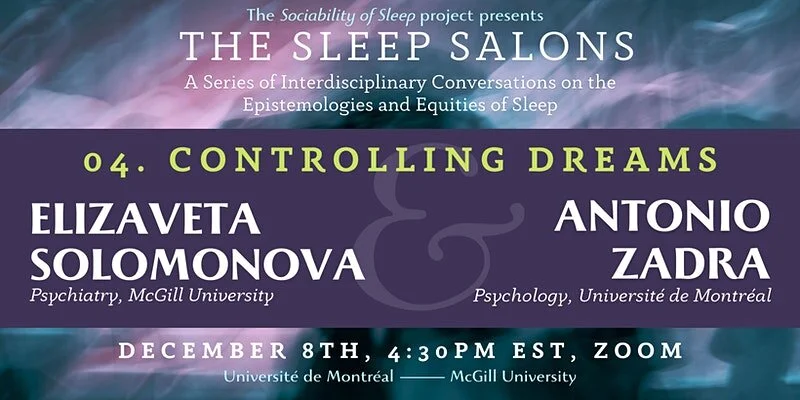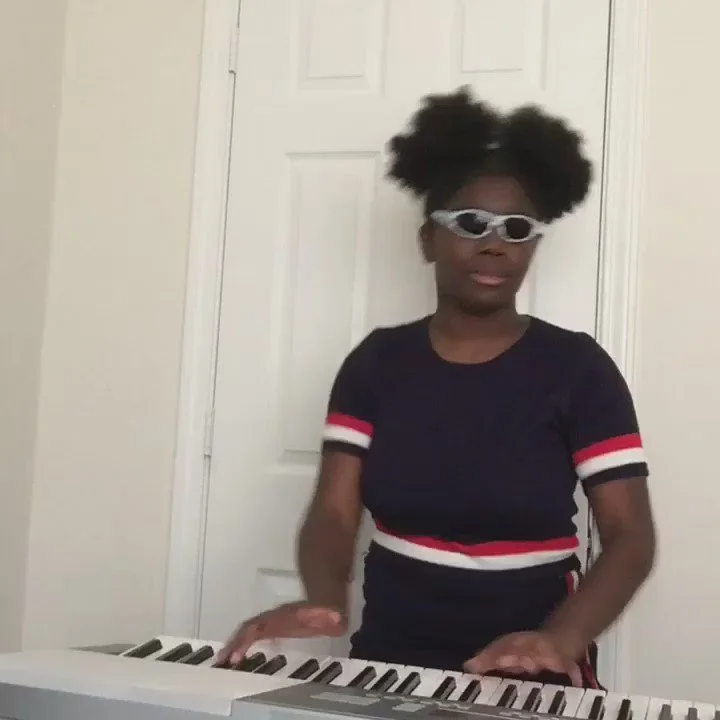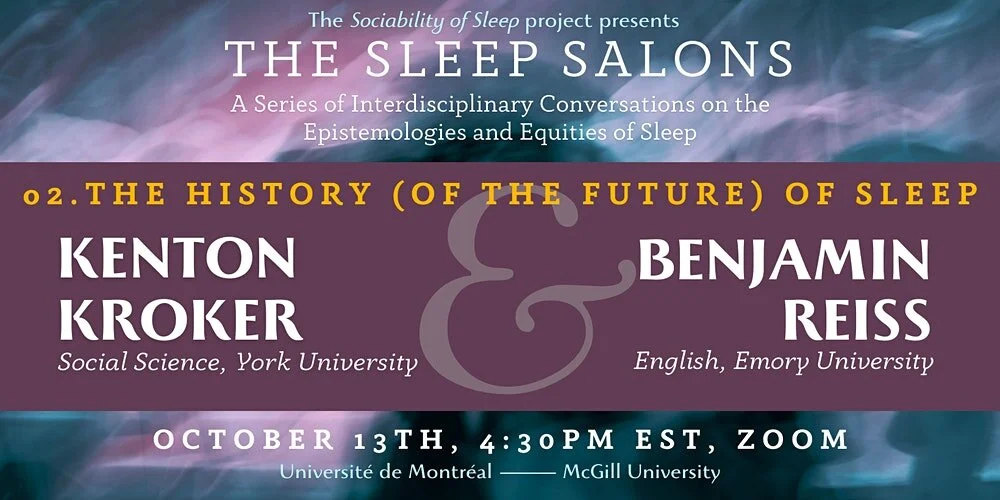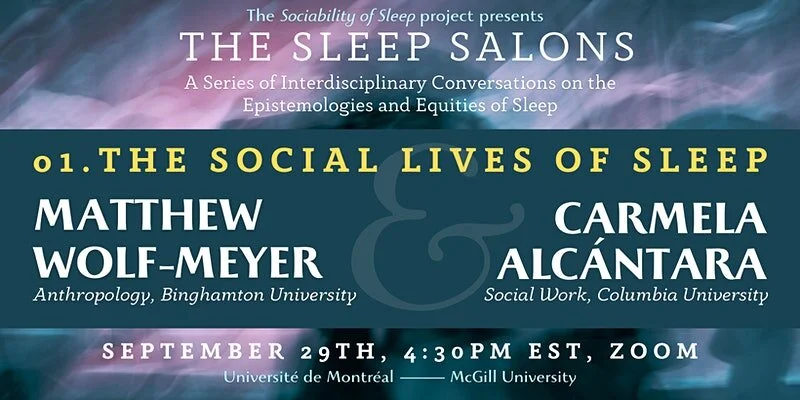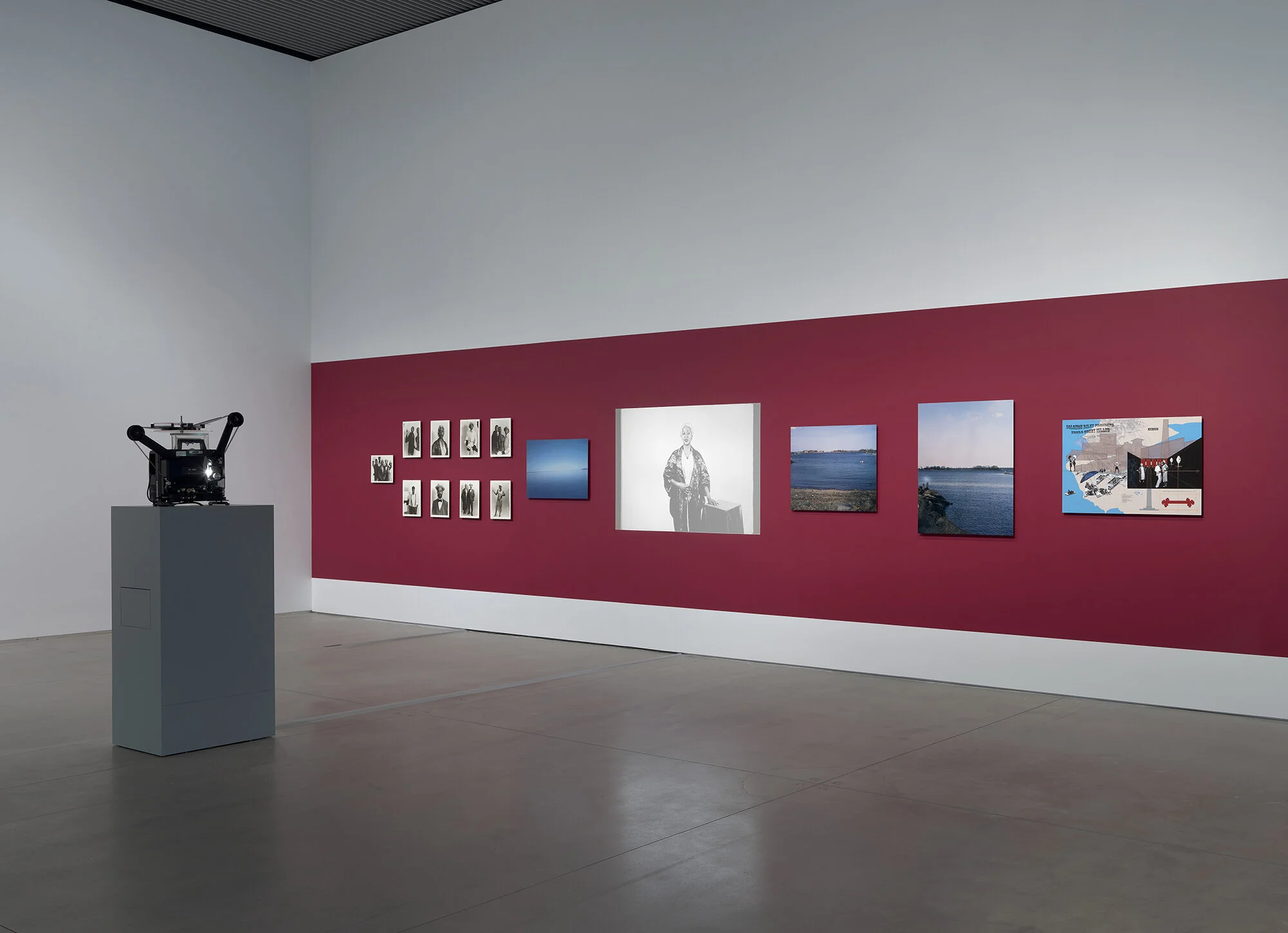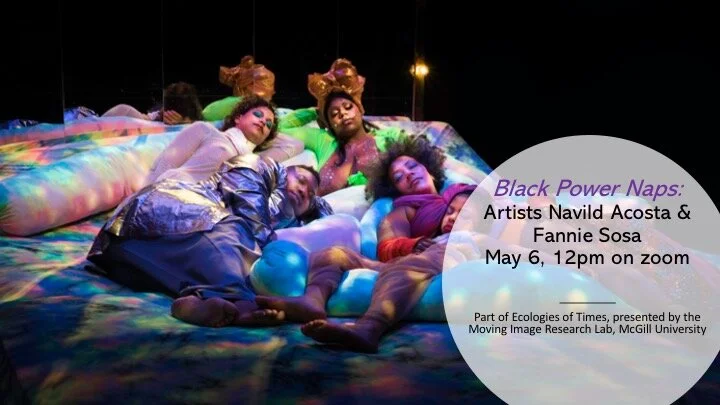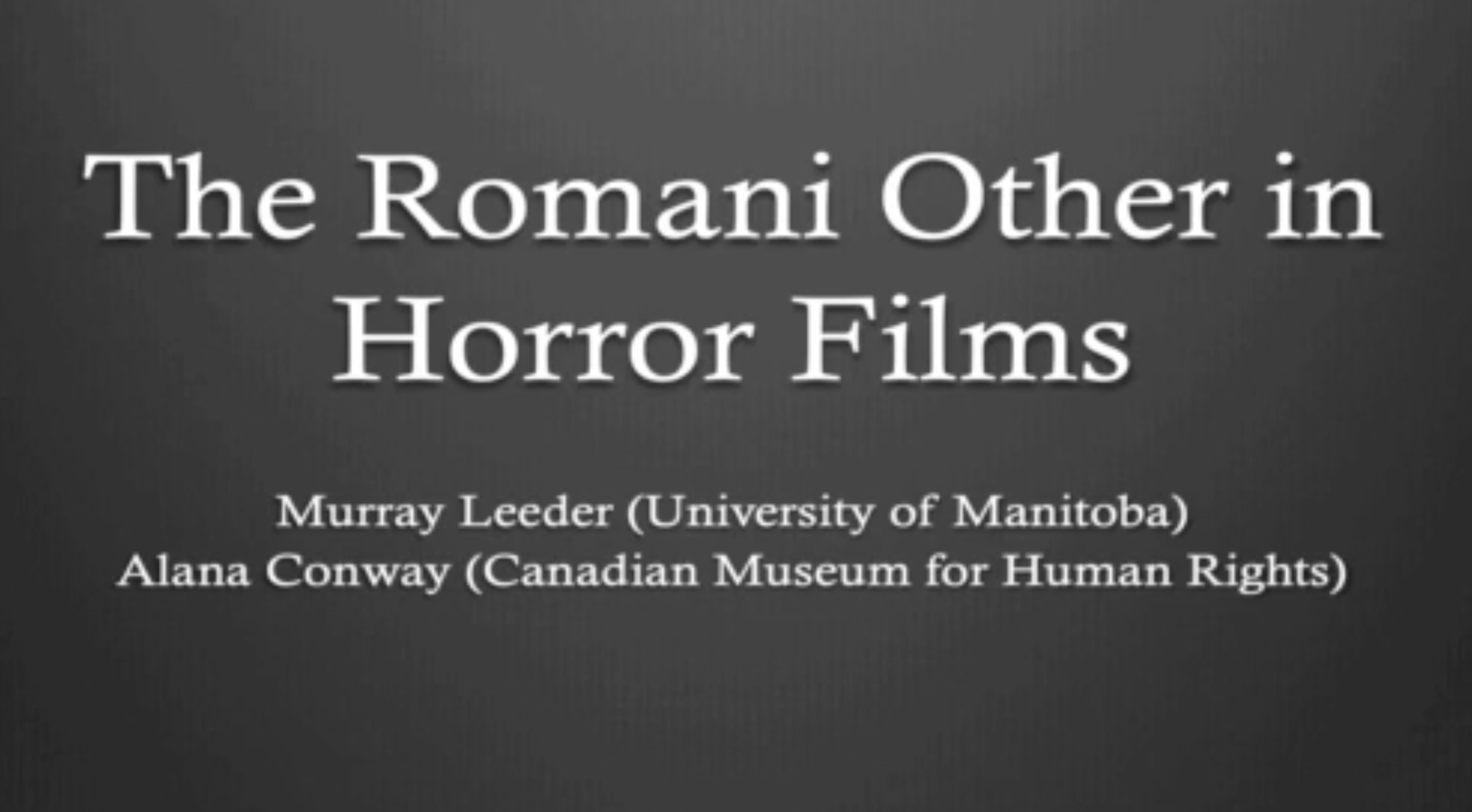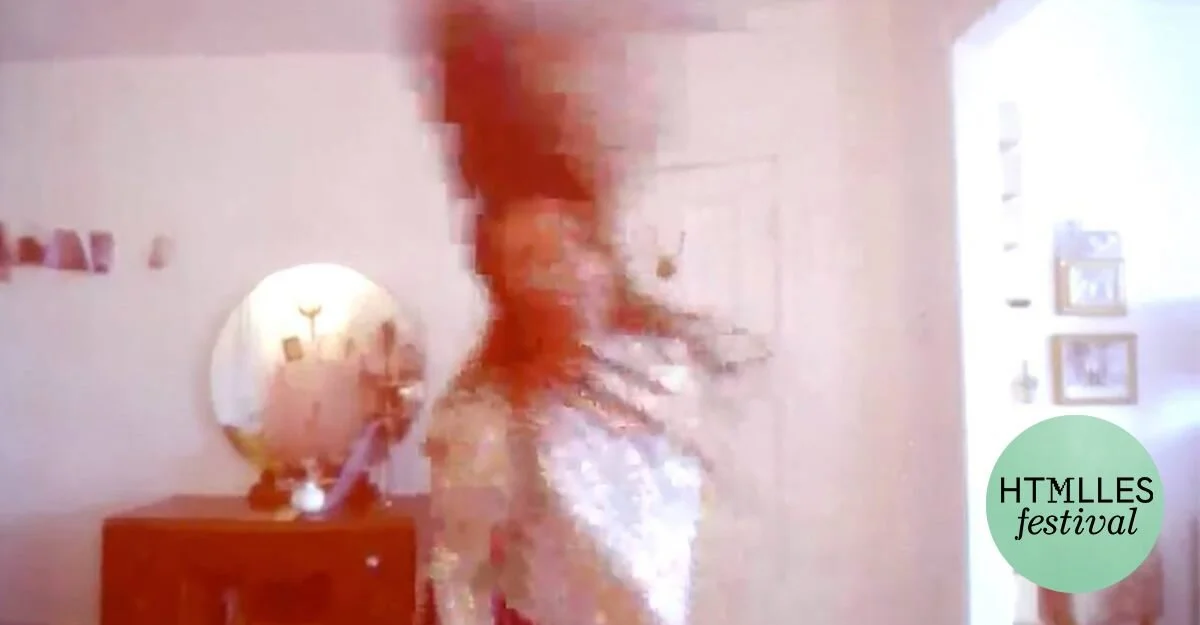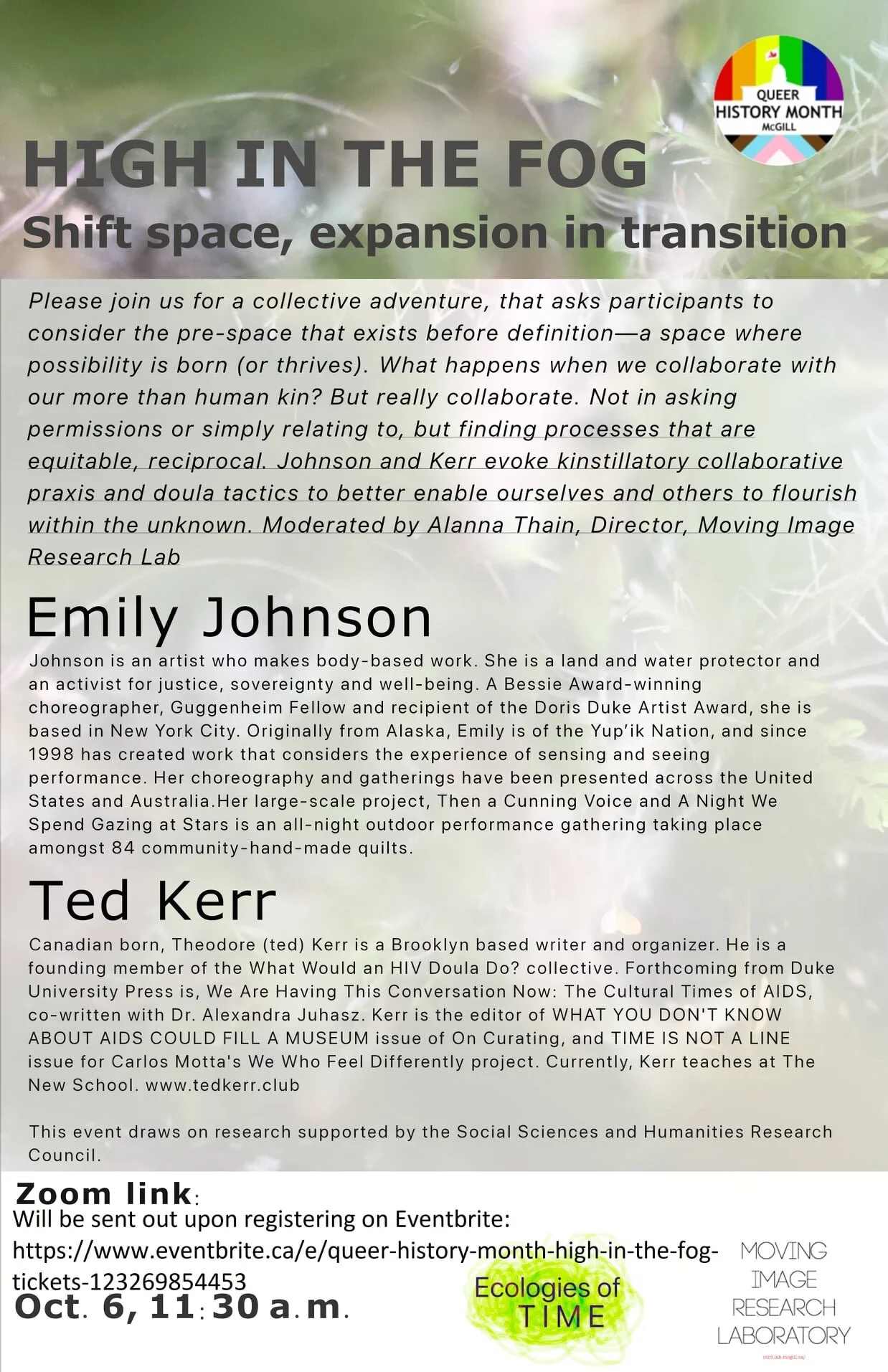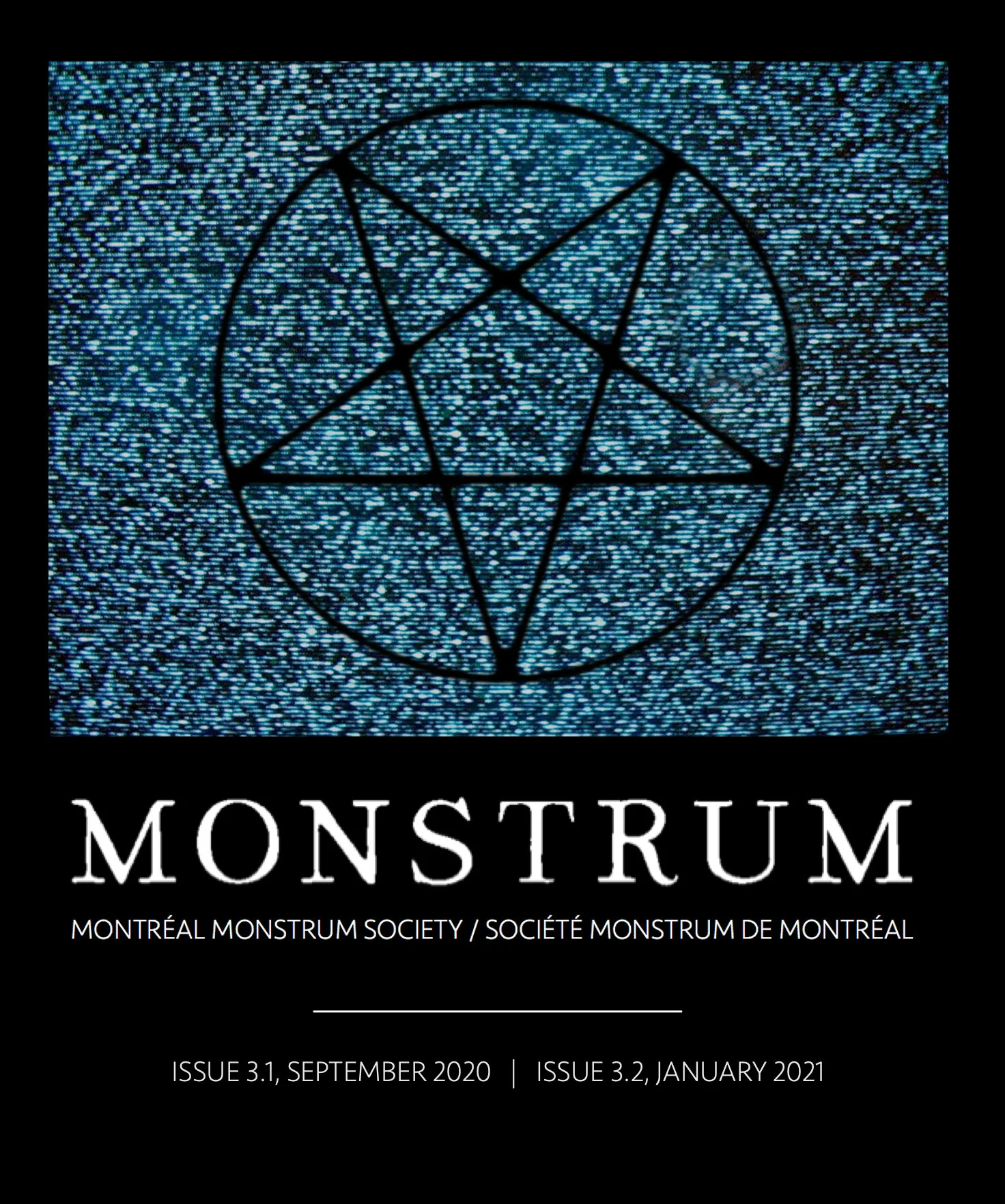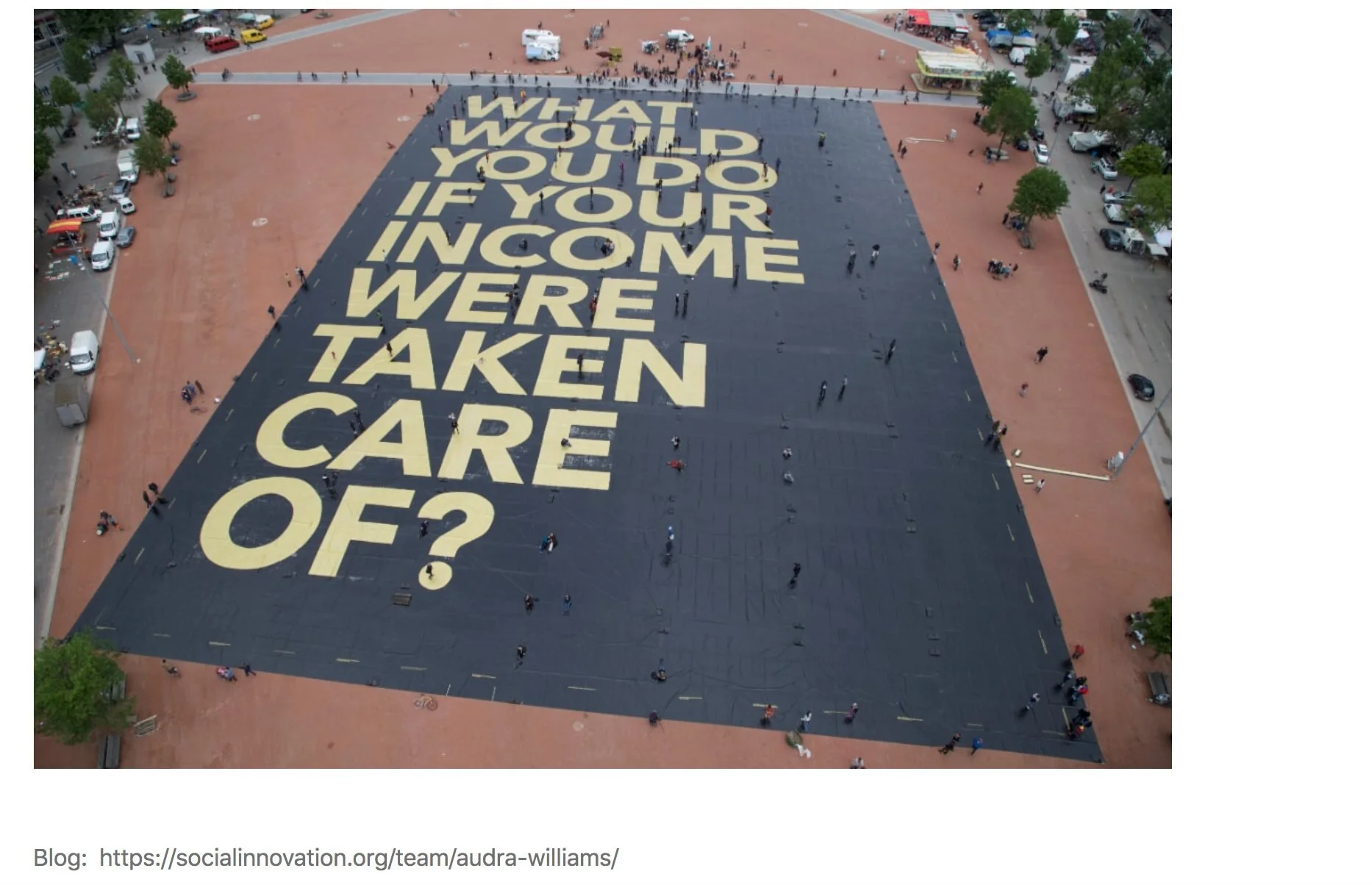Upcoming


PHIXSOSXDSC HOW TO STAY SLEEPY
What happens in the aftermath of infinity? The Sociability of Sleep is collaborating with the Fondation Phi’s exhibition Yayoi Kusama: DANCING LIGHTS THAT FLEW UP TO THE UNIVERSE and doux soft club’s bleu de lieu participatory installation for a day long exploration of this question: How to Stay Sleepy?
Again and again, we have encountered images of Kusama resting and sleeping in the world of her own work. For everyone, sleep is an everynight practice of meeting the edge of experience, in which we are all experts and always beginning again. Through her art, her techniques of repetition, and her explorations at the edge of the perceptual, the sensible and the real, Kusama provokes that threshold feeling of the fall into sleep, when the world shifts around us and anything becomes possible. Much of her work and her life has explored the question of how to make such experiences of intensity and uncertainty both liveable and shareable.
In How to Stay Sleepy, visitors will be invited to experiment with their own experiences at the edge of sleep, the hypnagogic state and the remix of dreams, imagination and the everyday. Guided by SoS’s team of expert artists, sleep scientists and fellow sleepers, we invite you to extend the edge of infinity as you step out of Kusama’s world. You choose how you wish to take part: through the Kusama sleep questionnaire, by recording your sleep rests and remixing the onsite soundscape, by napping alongside the action, opening up the infinite angles of sleep.
This work is made possible in part by the New Frontiers in Research Fund and the Social Sciences and Humanities Research Council of Canada
Foundation Phi, Montréal,
465 Saint-Jean Street, Education Room (SS01)
Free · Reservations required
To participate in the “How to Stay Sleepy” event, please reserve a spot by contacting Daniel Fiset at dfiset@phi.ca.
The experience will also be accessible to people who have tickets to visit the Yayoi Kusama exhibition on December 10, 2022.
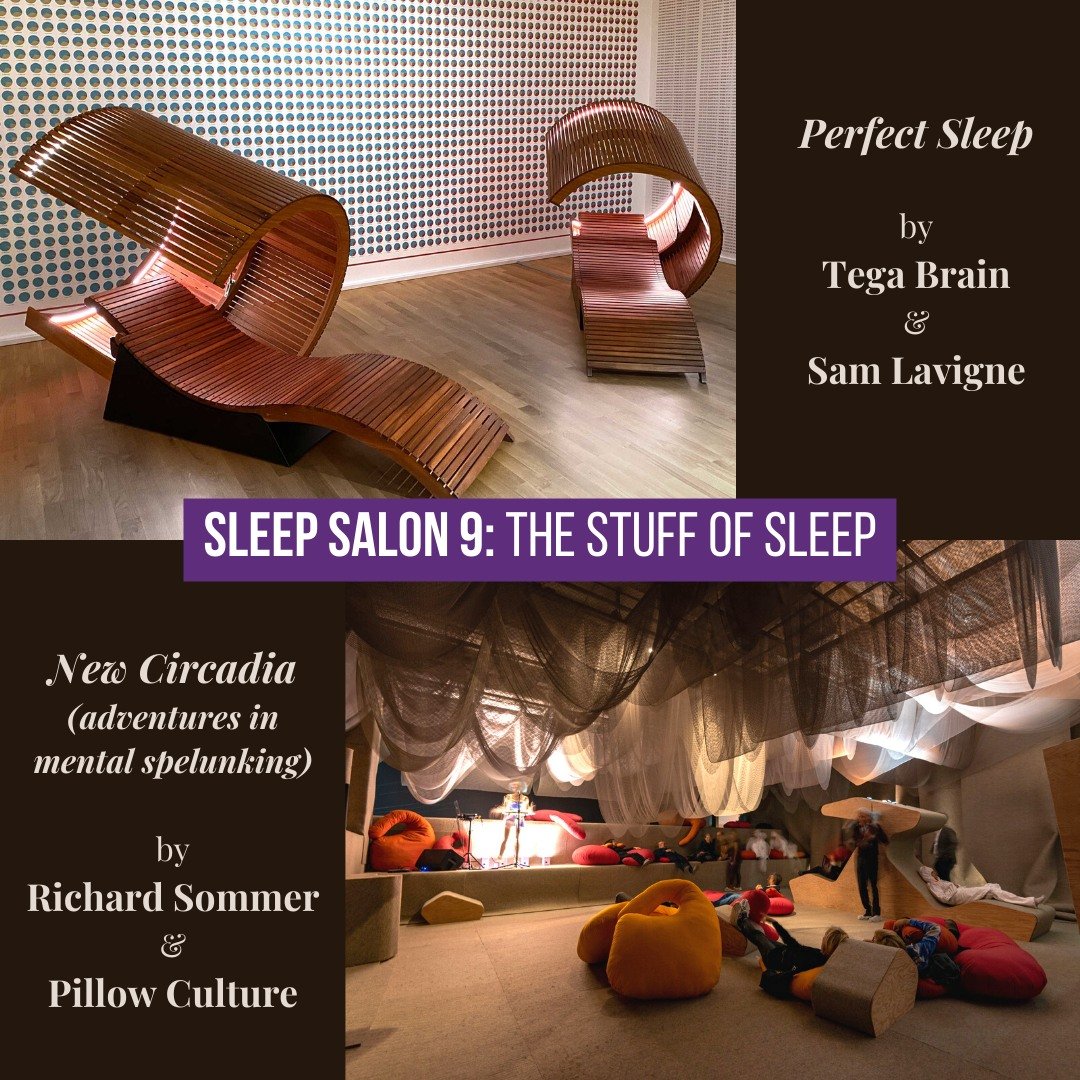
Sleep Salon #9: "The Stuff of Sleep"
⟡ About our Sleep Salon 9 guest speakers ⟡
► Tega Brain (Assistant Professor of Integrated Digital Media, New York University) is an Australian-born artist and environmental engineer whose work examines issues of ecology, data systems and infrastructure.
► Sam Lavigne (Assistant Professor in the Department of Design at UT Austin) is an artist and educator whose work deals with data, surveillance, cops, natural language processing, and automation.
Their collaboration on Perfect Sleep plays with self-tracking apps and furniture design, linking sleep to climate change, Silicon Valley and The Magic Mountain. On Twitter: @tegabrain / @sam_lavigne
► New Circadia is a collaboration between Richard Sommer (Professor of Architecture, University of Toronto), and Natalie Fizer (Parsons New School) and Emily Stevenson of the design team Pillow Culture.
Their recent co-curated exhibition Adventures in Mental Spelunking was inspired by Nathaniel Kleitman’s sleep experiments in Mammoth Cave, Kentucky to rethink the roles of daydreaming, sleep, and repose in contemporary design and architecture.
► Moderated by Curator and SoS Postdoctoral Fellow Erandy Vergara!
Perfect Sleep: https://perfectsleep.labr.io/
New Circadia: https://www.daniels.utoronto.ca/.../new-circadia...
◈ April 20, 4.30pm - 6pm ET ◈
- Details & free registration -
Eventbrite: https://www.eventbrite.com/e/235667095627
Facebook event: https://fb.me/e/2KNrVNBGx
◈◈◈◈◈⠀
Watch our previous Sleep Salons on YouTube: https://buff.ly/3uJncs4
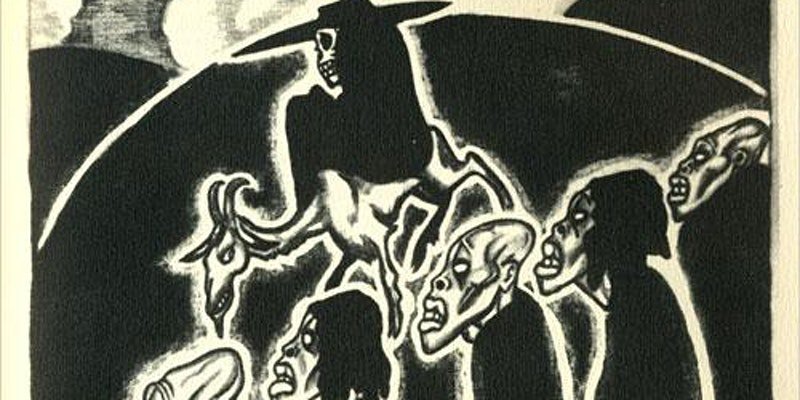
Undead Labor and the Uncanny Vitality of the Zombie
Talk from David Bering-Porter, New School

NOCTURAL MILIEUS: A SOUND DESIGN AND SLEEP WORKSHOP with Devon Bate
Thursday, March 10, 2022
2-4pm EST, on Zoom
This workshop explores the sonic dimension of sleeping spaces using the tools of a sound designer. Through embodied listening practices alongside digital media, we rediscover the shapes and textures of these intimate soundscapes–and the way we negotiate our environment while seeking rest.
Devon Bate is a composer and sound designer, currenlty Research Assistant with the Sociability of Sleep, and an MA student at Concordia University. His creative work explores how listening shapes social space, community and identity, and his academic research focuses on backgroun noise and ambient audiovisual media on popular streaming platforms.

Nocturnal Milieus: Sound Design and Sleep
NOCTURNAL MILIEUS: A SOUND DESIGN AND SLEEP WORKSHOP
Thursday, March 10 || 2-4pm EST, on Zoom
► Register on Eventbrite (limited space!): https://www.eventbrite.com/e/274565612137
━━━━━━━━━━━━━━▼━━━━━━━━━━━━━━
“As the faithful, in the Dionysian mysteries, invoke the god by miming scenes from his life, I call up the visitation of sleep by imitating the breathing and posture of the sleeper.”
- Merleau-Ponty
For Merleau-Ponty, sleep is a performance in which we, as actors, imitate sleepers until we become one; the bed as our stage, and the room as our theatre. As we close our eyes to rest, we are left with the sounds of the theatre to support – or sabotage – our nightly performance.
In this workshop, we will be exploring the sonic dimension of sleeping spaces using the tools of a sound designer. Through embodied listening practice alongside digital media, we will rediscover, and perhaps redesign, the shapes and textures of these intimate soundscapes - and the way we negotiate our environment while seeking rest.
The workshop will include a guided listening exercise grounded in electroacoustics ear training and Viewpoints, and the opportunity to construct a personalized sound design for sleep, followed by sharing and discussion. It will be held on Zoom; participants are invited to join from and work with their own private space, ideally where they usually sleep or nap.
► Technical requirements: a laptop or phone. Headphones or speakers would be useful, though aren’t necessary.
━━━━━━━━━━━━━━▲━━━━━━━━━━━━━━
This workshop will be led by composer and sound designer Devon Bate, who is currently a Research Assistant with Sociability of Sleep and an MA student at Concordia University. His creative work explores how listening shapes space, community and identity, and his academic research focuses on background noise and ambient audiovisual media on popular streaming platforms.
► Find Devon on Instagram @bufflo.prod and visit his website: www.devonbatemusic.com
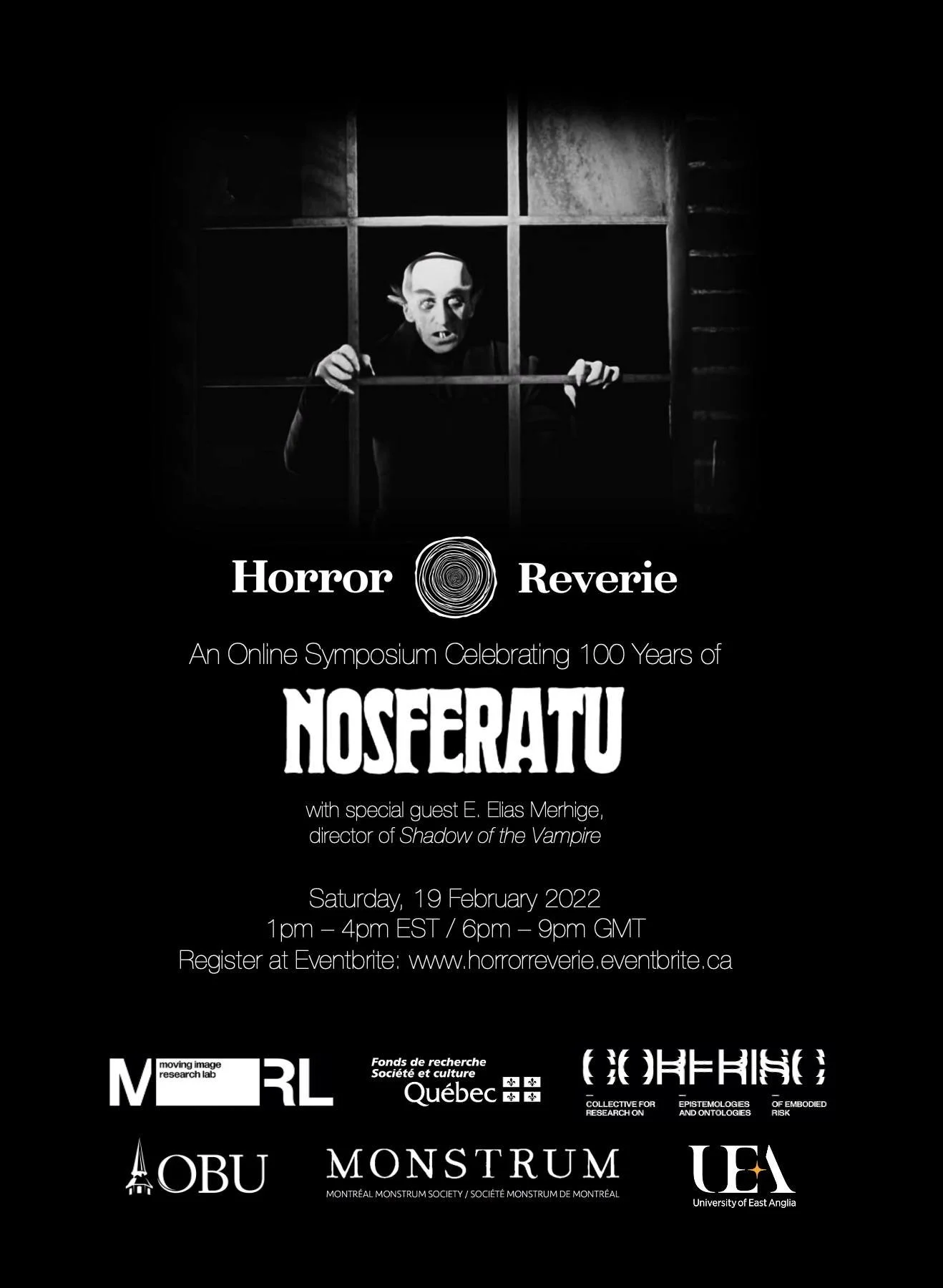
Horror Reverie Nosferatu Symposium
The Horror Reverie Nosferatu symposium features three panels on topics including filming locations, actor histories, re-scoring and restoration, queer readings, and more. Panelists include filmmakers, musicians, silent film historians, and horror film scholars. Check the Horror Reverie webpage for more details as they come.
Registration is free. A detailed schedule and Zoom link will be sent to registrants closer to the event date.
Co-sponsored by the Collective for Research on Epistemologies of Embodied Risk (CORÉRISC), the Montréal Monstrum Society and Monstrum, Oklahoma Baptist University, the University of East Anglia, and the Moving Image Resource Lab, with support from the Fonds de recherche du Quebec, société et culture.

DREAM SCENES: A COMIC AND ZINE WORKSHOP with Jenny Lin
Friday, February 11, 2022
2-4pm EST, on Zoom
In this workshop, I will share some of the dream recall, recording and editing strategies I’ve used when creating my “Pandemic Dreams” comic series, and talk about my interest in writing and drawing about my dreams as a way of navigating the space between documentation and fiction. We will discuss strategies of selection that can be used to distill and convey the feeling and narrative? of a dream; how dream recording can be a meaningful personal exercise; and how it can also be approached as a gesture of sociability, with a reader / viewer in mind.
This workshop will include some hands-on zine-making activities of a few single-sheet structures, as well as short writing and drawing exercises that activate these zine structures into platforms for our dreams.
Participants are welcome to share their own dream writing and comics created during this workshop.
To follow along in the exercises, please have with you:
a dream you remember
6 sheets of paper that are easy to fold by hand (I will be using 8.5 x 11” printer (bond) paper for my demonstrations but you can use other types you might have on hand)
a ruler
scissors or an exacto knife with a surface to cut on (for example, a piece of corrugated cardboard or a self-healing cutting mat)
a pencil
an eraser
Jenny Lin is a visual artist based in Tiohtiá:ke / Mooniyang / Montréal. Working with experimental narrative and autobiographical fiction, primarily in the form of print-based installations, artists’ books and zines, Lin is drawn to the socio-political, accessible and community-based aspects of print and zine-making, self-publishing and self-distribution. Lin uses drawing and text as a way to process life experiences and current events, parsing situations into visual sequences that move through, in particular, discomfort, ambiguity and uncertainty. She has collaborated with Eloisa Aquino as B&D Press, a queer art and micropress project, since 2009. Lin was involved as a core member of Qouleur Qollective, a member of articule’s Fabulous Committee, and cofounded the Queer Print Club at Concordia University where she teaches as a sessional instructor in the Print Media Program Area.
Somnambulations Graduate Colloquium
Somnambulations:
New Directions in Interdisciplinary Approaches to Sleep
A Graduate Colloquium organized by The Sociability of Sleep
January, 28 | 9.30am – 5pm EST | On Zoom
Registration: https://www.eventbrite.com/e/237871268367
Somnambulations: New Directions in Interdisciplinary Approaches to Sleep is a full-day colloquium featuring graduate students and emerging scholars addressing sleep from a variety of disciplinary contexts. It embodies the critical and creative sociocultural approach to sleep and sleep science that is fundamental to the Sociability of Sleep project.
⯁ Welcome and opening remarks (9:30am)
Aleksandra Kaminska (Communication, Université de Montréal) and Alanna Thain (English, McGill University)
⯁ Panel 1 (9:30am-10:20am) Sleeping Soundly
Devon Bate (Media Studies, Concordia University)
“Spectacular Rest: How to Sleep in the Attention Economy”
Josh Dittrich (Communication, Culture & Technology, University of Toronto)
“Counting Sheep Beats: Toward a Sonic Materialism of Sleep”
Moderator: Aleksandra Kaminska (Communication, Université de Montréal)
⯁ Panel 2 (10:30am-11:20am) Sleep’s Creative Thresholds
Cedric Kayser (French Language and Literature, Université de Montréal)
“Bodily Atmospheres: The Impact of Ambient Music on the First Stage of Sleep (N1)”
Sandra Huber (Interdisciplinary Humanities, Concordia University)
“SleepWriter: Composing the Electricity of Sleep”
Moderator: Josh Dittrich
⯁ Panel 3 (11:30am-1:00pm) Critiquing Norms in Sleep and Sleep Research
Ryan Staples (Humanities, York University)
“To Whom Does the Dream Belong? Negotiating Expertise in the Early History of the International Association for the Study of Dreams (IASD)”
Josianne Barrette-Moran (Bioethics, McGill University)
“Let the Night Owls In: A Patient-as-Partner Approach to Actualizing Sleep Assessment Tools”
Kristie Serota (Public Health, University of Toronto)
“Unstitching the Sleep Industrial Complex: Reflections on the Medicalization and Commodification of Sleep”
Moderator: Elizaveta Solomonova (Psychiatry, McGill University)
⯁ BREAK (1:00pm-2:15pm)
⯁ Panel 4 (2:15pm-3:45pm) Arts of Rest and Resistance
Josie Roland Hodson (African American Studies and History of Art, Yale University)
“Rest Notes: On Sleep and Black Contemporary Art”
Stacey Cann (Art Education, Concordia University)
“Rest, Slowness, and the Morality of Labour”
Victoria Stanton (Art Education, Concordia University)
“Modeling Rest, Cuing Recovery: On Activating (Doing) Nothing in the Revitalized Third Place”
Moderator: Natalie Doonan (Communication, Université de Montréal)
⯁ Performance (4pm) Bureau of Noncompetitive Research
Steeped In
Introduced by Josh Dittrich
*******************
Somnambulations is organized by Aleksandra Kaminska (Associate Professor, Université de Montréal), Alanna Thain (Associate Professor, McGill University), Josh Dittrich (UofT), and Erandy Vergara (Postdoctoral Fellow, Sociability of Sleep).
The Sociability of Sleep is two-year research program supported by the Government of Canada’s New Frontiers in Research Fund (NFRF) that explores both everyday and exceptional experiences of sleep and its disturbances. The Colloquium is also supported by a bursary from the Canadian Communication Association.
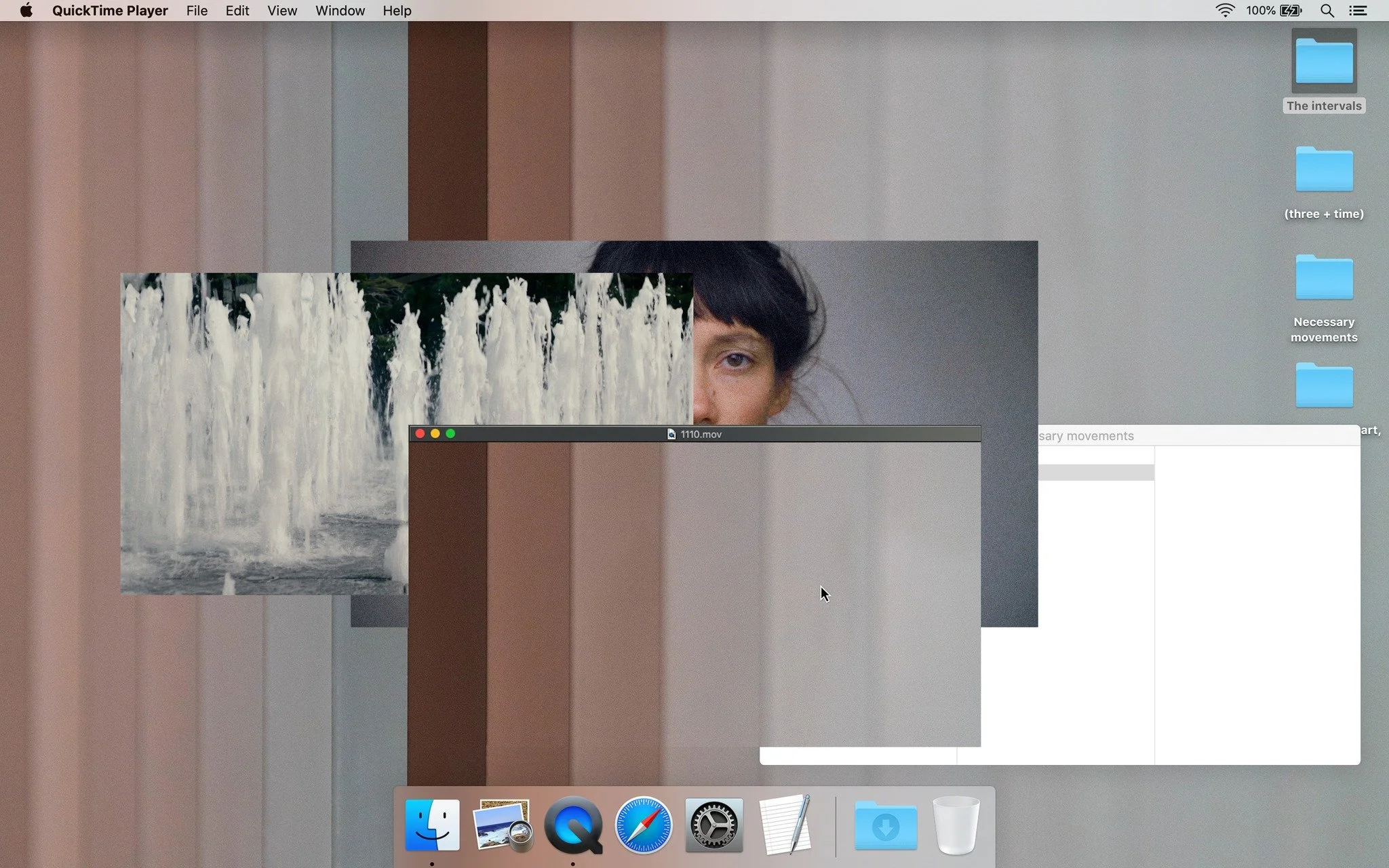
Ada X: "Proscenium"
Destinée à être visionnée sur un appareil personnel, la vidéo 𝙋𝙧𝙤𝙨𝙘𝙚𝙣𝙞𝙪𝙢 d’Allyson Packer et Jesse Fisher explore l’effondrement de l’espace « réel » et virtuel. La présentation vidéo sera suivie d'une discussion animée par Alanna Thain.
Jeudi 27 janvier, 19h — 20h
En ligne
Inscrivez-vous via ce lien : https://us06web.zoom.us/.../reg.../WN_Dv1UEEBESXeWE1eoOXGk5g
_
Intended to be viewed on a personal device, Allyson Packer and Jesse Fisher's 𝙋𝙧𝙤𝙨𝙘𝙚𝙣𝙞𝙪𝙢 explores the collapse of "real" and virtual space. The video presentation will be followed by a discussion moderated by Alanna Thain.
Thursday, January 27th, 7 — 8 pm
Online
Register via this link: https://us06web.zoom.us/.../reg.../WN_Dv1UEEBESXeWE1eoOXGk5g
Image : courtoisie des artistes

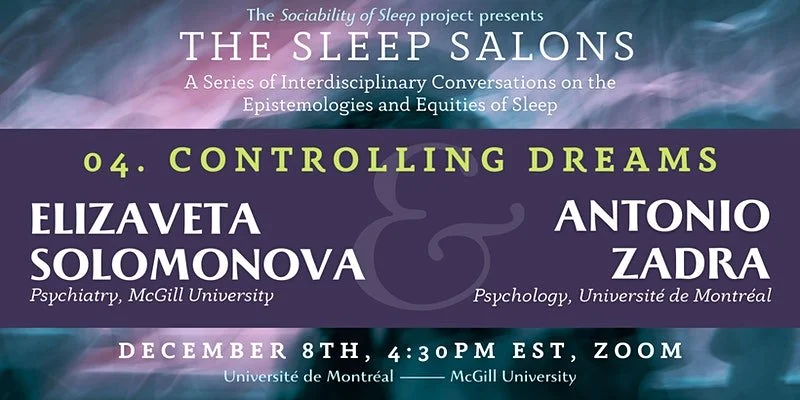
Sleep Salon 4: Controlling Dreams, w A. Zadra and E. Solomonova
Speakers:
Antonio Zadra (Psychology, Université de Montréal)
Elizaveta Solomonova (Psychiatry, McGill University)
Is it possible to control dreams through lucid dreaming states? Do dreams control us in the form of nightmares and other disturbances along the sleep/wake threshold? The act of dreaming and the research on dreams raise profound questions about the modes of agency, (inter)subjectivity and experience that we inhabit through sleep. This Salon brings together dream researchers from the team at the Sociability of Sleep to discuss the philosophical and social questions raised at the margins of the dream world.
✦ Antonio Zadra is Professor of Psychology at the Université de Montréal, where he is a researcher at the Center for Advanced Research in Sleep Medicine. Having published extensively on dreams and parasomnias in both scientific and popular literature, he is most recently co-author of When Brains Dream: The Science and Mystery of Sleep.
✦ Elizaveta Solomonova is a postdoctoral fellow in Psychiatry at McGill University and member of the Culture, Mind and Brain research group. Her interdisciplinary work considers consciousness and experience across wake-sleep states, with an interest in dreaming, empathy and intersubjectivity. Her recent work includes the impact of the COVID pandemic on sleep.
Moderator Claudia Picard-Deland is a PhD candidate in Neuroscience at the Université de Montréal, working in the Sleep and Nightmare Lab at Montréal’s Sacré-Coeur Hospital. Her research interests include dreaming and memory consolidation; nightmares; sleep during the pandemic; and the effects of VR simulation on dreaming.
_____
The Sleep Salons are curated by Josh Dittrich (Postdoctoral Fellow, Université de Montréal), Aleksandra Kaminska (Associate Professor, Université de Montréal), and Alanna Thain (Associate Professor, McGill University). They are part of a year-long series:
Salon 1: The Social Lives of Sleep, ft. M. Wolf-Meyer & C. Alcántara: September 29
Salon 2: The Future of (the History of) Sleep, ft. K. Kroker & B. Reiss: October 13
Salon 3: Traumatic Sleep, ft. F. Nudelman & J. Blanc: November 17
Salon 4: Controlling Dreams, ft. A. Zadra & E. Solomonava: December 8
The Sociability of Sleep is two-year research program that explores both everyday and exceptional experiences of sleep and its disturbances. Launching our programming this Fall are the Sleep Salons, monthly public sessions featuring scholars, artists, and researchers on sleep, showcasing innovative research though conversations that examine how we learn and know about sleep, and that question and expand the methodologies, epistemologies, and equities of sleep knowledge. Exploring the value of sleep research in art and design, humanities, and social sciences, and taking experiential, experimental, critical, and sociable approaches to sleep, each monthly Salon pairs short talks (ca. 25 minutes) from two featured speakers to generate interdisciplinary insights in the ensuing discussion about the sociability of sleep.
The Sociability of Sleep and its Sleep Salons are supported by funding from the Government of Canada’s New Frontiers in Research Fund (NFRF).
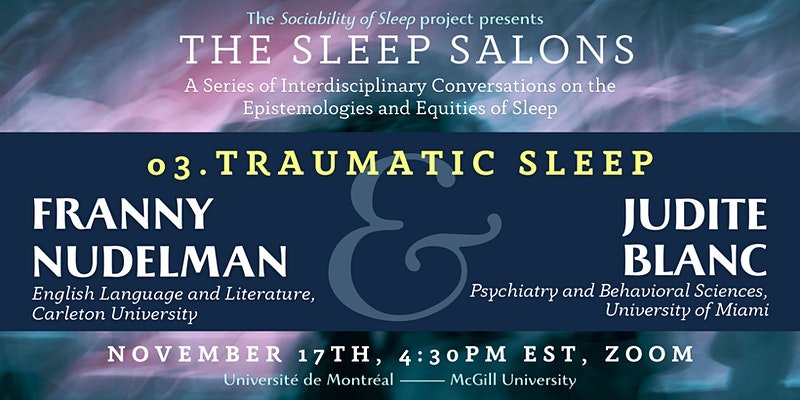
Sleep Salon 3: Traumatic Sleep, with Franny Nudelman and Judite Blanc
Speakers
Franny Nudelman (English, Carleton University)
Judite Blanc (Psychiatry and Behavioral Sciences, University of Miami)
How does the sleep of individuals and populations register traumatic experiences and events, from war to natural disasters? How has sleep served to shape our understanding, treatment and experience of trauma? For our featured speakers, the question remains how sleep might also serve as an expression of resilience and resistance to the traumas it enfolds.
✦ Franny Nudelman is Professor of English at Carleton University, focusing on war in 19th and 20th century US culture. Her recent book Fighting Sleep: The War for the Mind and the US Military looks critically at military-scientific interventions into the troubled sleep of US combat veterans, as well the efforts of a group of Vietnam veterans to transform sleep into a form of antiwar protest.
✦ Judite Blanc is Assistant Professor of Psychiatry and Behavioral Science at the Miller School of Medicine of the University of Miami, having just completed a postdoctoral fellowship at New York University School of Medicine’s Center for Healthful Behavioral Change. Her research examines the impact of traumatic and chronic stress on sleep and health outcomes, tackling racial/ethnic and gender disparities locally, nationally, and globally.
Moderated by Alanna Thain, Associate Professor of English at McGill University, director of the Moving Image Research Lab and the research team CORERISC (Epistemologies of Embodied Risk) and former director of the Institute for Gender, Sexuality and Feminist Studies. As a co-applicant for the Sociability of Sleep project, she is interested in exploring sleep’s intimate opacities, when we become other to ourselves. Her work explores sleep’s relation to radical forms of care and relationality in queer and feminist cinema and performance and in relation to urban ecologies.
_____
The Sleep Salons are curated by Josh Dittrich (Postdoctoral Fellow, Université de Montréal), Aleksandra Kaminska (Associate Professor, Université de Montréal), and Alanna Thain (Associate Professor, McGill University). They are part of a year-long series:
Salon 1: The Social Lives of Sleep, ft. M. Wolf-Meyer & C. Alcántara: September 29
Salon 2: The Future of (the History of) Sleep, ft. K. Kroker & B. Reiss: October 13
Salon 3: Traumatic Sleep, ft. F. Nudelman & J. Blanc: November 17
Salon 4: Controlling Dreams, ft. A. Zadra & E. Solomonava: December 8
The Sociability of Sleep is two-year research program that explores both everyday and exceptional experiences of sleep and its disturbances. Launching our programming this Fall are the Sleep Salons, monthly public sessions featuring scholars, artists, and researchers on sleep, showcasing innovative research though conversations that examine how we learn and know about sleep, and that question and expand the methodologies, epistemologies, and equities of sleep knowledge. Exploring the value of sleep research in art and design, humanities, and social sciences, and taking experiential, experimental, critical, and sociable approaches to sleep, each monthly Salon pairs short talks (ca. 25 minutes) from two featured speakers to generate interdisciplinary insights in the ensuing discussion about the sociability of sleep.
The Sociability of Sleep and its Sleep Salons are supported by funding from the Government of Canada’s New Frontiers in Research Fund (NFRF).
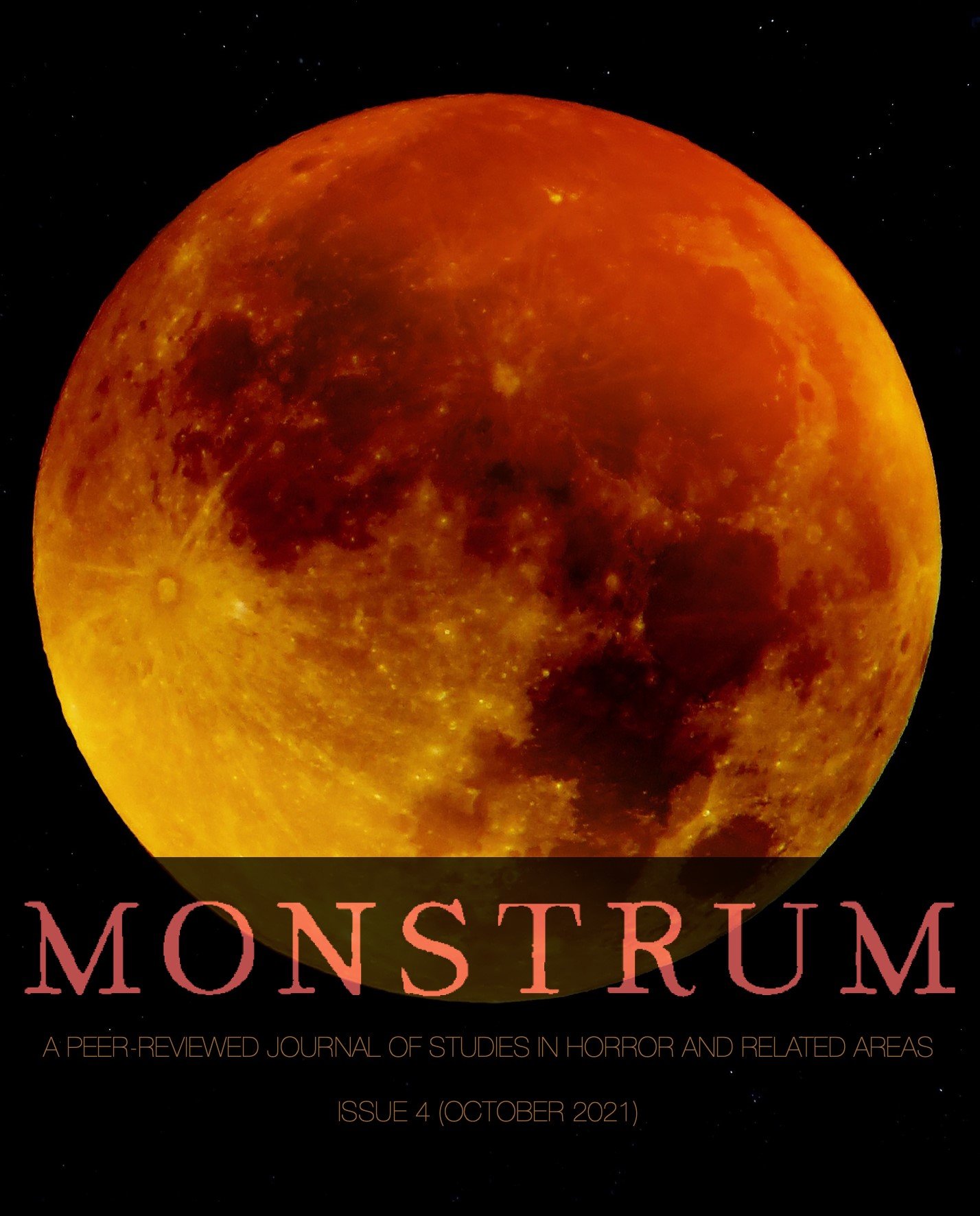
CFP: Monstrum 5.2
CFP: Special Issue, Monstrum 5.2 : Short-Form Horror: History, Pedagogy, and Practice
Editors
Drs. Alanna Thain (McGill University) and Sonia Lupher (University of Pittsburgh)
Description
From TV to TikTok, movie trailers to music videos, and GIFs to short films, the short for dominates most of our media consumption. The horror genre is ripe for experimentation in the short form, through screamer videos, short stories and flash fiction, television series, and even commercials. Today, most horror creators work primarily in the short form; with the continuingly prohibitive costs associated with a sustained feature-length filmmaking career, many filmmakers and creators—particularly those marginalized by race, gender, or socioeconomic status—prefer, or are compelled, to explore the creative and professional possibilities of short-form media. While the number of BIPOC, queer, and women-identifying creators who have established and successful careers in horror filmmaking remain few and far between, the short-form market is brimming with content from these often marginalized voices and is, therefore, one of the most productive media niches for theorizing issues of race, gender, sexuality, disability, and the intersectionality of these identifiers in the horror genre. In attending to the richness of the short form, how can scholars, makers and curators not simply diversify the content and canon of horror as a field, but also challenge our assumptions of how we read, analyze, consumer and react to horror media However, the saturation of independently-created media online and other platforms also presents limitations and challenges, above all the difficulty to curate and spread information about content, creators, and titles. Organized and curated services such as Shudder and YouTube’s “Alter” channel attempt to counteract the populated video heaps on services such as Amazon Prime and Vimeo. Scouring through the titles on many of these services can be unproductive and unwieldy, despite the growing interest among professionals and instructors to create and screen short-form horror in courses and for use in digital humanities projects. The challenges and productive avenues of studying short-form horror intersect with those of studying the short form at large, itself a diverse topic of study due to the multiple forms, genres, and cultural contexts that comprise it. Though short-form horror is often devalued as simply a calling card to a future in features, how might we attend to the affordances of the short form’s value in itself?
This special issue therefore contributes to the intersections of study between short-form media and horror media. We invite scholars, critics, and digital creators to propose articles, interviews, or audiovisual essays that analyze and theorize short form horror texts, trends, teaching strategies, curatorial challenges and solutions, and propose new methods for the study of short-form horror. We especially welcome work by emerging and independent scholars, and from scholars or research areas currently underrepresented in the field. We invite submissions on topics including, but not limited to, the following:
• Textual analysis of short-form or serial horror texts or creators, including short films, online videos, commercials, TV series, podcasts, music videos, dance films, horror GIFs, short stories, flash fiction, multimedia projects, photo essays, video essays, experimental film, etc.
• The circulation of short-form horror, including television, film festivals, online platforms, etc.
• Short-form horror curation (digital, physical, museum/festival settings, etc.)
• Interviews with short-form horror creators
• Teaching short-form horror texts and creators
• Industrial concerns (funding, production, and post-production) of short-form horror
• Intersectionality in short-form horror production, study, and pedagogy
• Histories of short-form production and distribution, including public broadcasting
Timeline
Completed essays will be between 5,000 and 7,000 words, including notes and references, and formatted according to standards set out in the current Chicago Manual of Style. Please see the Monstrum website for more information on submission guidelines. In addition to written essays, we strongly welcome multimodal submissions. In your proposal, please clearly specify the format and scope of your project, including intended length and other practical information.
October 31, 2021: Proposals due to the editors: please submit an abstract of approximately 250 words, including a title and format information. Please also send a bio of approx. 100 words.
November 30, 2021: Author acceptances sent out.
July 1, 2022: Accepted essays due to the editors, with revision timeline to follow.
December 2022: Publication
Please direct questions and submissions to corerisc@gmail.com (please include “Monstrum Short Form” in subject line).

The Cinema of Tobe Hooper with Joe Bob Briggs and guests
American Twilight explores the long and checkered career of Tobe Hooper in what Joe Bob Briggs has called “a minor miracle in scholarship, beginning the long-term definition of an artist who … went from being one of the most despised filmmakers in the world … to a visionary worthy of study.” Woofter and Dodson will discuss their book and Hooper’s films with a panel of experts, and include livechat Q&A for viewers.
The panel will also feature Stan Giesea, who worked with Hooper on Spontaneous Combustion, I'm Dangerous Tonight, and other projects; Julius Banzon, webmaster of “The Tobe Hooper Appreciation Society”; and Scout Tafoya, author of Cinemaphagy: On the Psychedelic Classical Form of Tobe Hooper.
Purchase the book at a 30% discount with free shipping on domestic orders at utexaspress.com with the promo code UTXTOBE.
Offer valid thru November 30 and available for any book published by UT Press. Discount will appear in cart at final checkout.
About the editors
Dr. Kristopher Woofter teaches film and literature in the English department at Dawson College, Montréal, Québec. Dr. Will Dodson teaches film, literature, and rhetoric in the Ashby and Strong Residential Colleges at UNC Greensboro. They are the coeditors of American Twilight: The Cinema of Tobe Hooper, just published by University of Texas Press.
Sleep Salon 2: The Future of (the History of) Sleep w/ K Kroker and B Reiss
What can we learn about the future of sleep by studying its histories? Part of the Sleep Salons: A Series of Interdisciplinary Conversations
Speakers:
Kenton Kroker (Social Science, York University)
Benjamin Reiss (English, Emory University)
What can we learn about the future of sleep by studying its cultural, imaginative and scientific histories? Despite its status as non-experience, sleep has evolved into a perennial subject of cultural conversation, as well as a rigorously scrutinized object of scientific inquiry. How does tracing the often wayward and neglected histories of sleep enable us to think about where sleep is headed in the 21st century?
✦ Benjamin Reiss is Samuel Candler Dobbs Professor and Chair of English at Emory University. His book Wild Nights: How Taming Sleep Created Our Restless World uses literary history and cultural analysis to contextualize and critique the norms and pressures that every sleeper struggles to accommodate.
✦ Kenton Kroker is Associate Professor of Social Science at York University, where he is affiliated with the Health & Society program. His book The Sleep of Others and the Transformations of Sleep Research traces the evolution of the modern sleep laboratory and considers the technological and biopolitical forces that have contributed to the contemporary biomedicalization of sleep.
Moderated by Josh Dittrich, Postdoctoral Fellow with the Sociability of Sleep project. He writes about sound, media and environment and is currently pursing two projects: a book manuscript on the planetary scaling of sound and listening titled Geosonics, as well as a new project on “so(m)niferous media” that attends to the ways sleepers sonically (re)mediate their environments and experiences.
_____
The Sleep Salons are curated by Josh Dittrich (Postdoctoral Fellow, Université de Montréal), Aleksandra Kaminska (Associate Professor, Université de Montréal), and Alanna Thain (Associate Professor, McGill University). They are part of a year-long series:
Salon 1: The Social Lives of Sleep, ft. M. Wolf-Meyer & C. Alcántara: September 29
Salon 2: The Future of (the History of) Sleep, ft. K. Kroker & B. Reiss: October 13
Salon 3: Traumatic Sleep, ft. Franny Nudelman & Judite Blanc: November 17
Salon 4: Controlling Dreams, ft. Antonio Zadra & Elizaveta Solomonava: December 8
The Sociability of Sleep is two-year research program that explores both everyday and exceptional experiences of sleep and its disturbances. Launching our programming this Fall are the Sleep Salons, monthly public sessions featuring scholars, artists, and researchers on sleep, showcasing innovative research though conversations that examine how we learn and know about sleep, and that question and expand the methodologies, epistemologies, and equities of sleep knowledge. Exploring the value of sleep research in art and design, humanities, and social sciences, and taking experiential, experimental, critical, and sociable approaches to sleep, each monthly Salon pairs short talks (ca. 25 minutes) from two featured speakers to generate interdisciplinary insights in the ensuing discussion about the sociability of sleep.
The Sociability of Sleep and its Sleep Salons are supported by funding from the Government of Canada’s New Frontiers in Research Fund (NFRF).

Enervated: Sleep at the Edge of the Social (Panel at SLSA 2021)
Enervated: Sleep at the Edge of the Social
ABSTRACT. Sleep ailments are a chronic condition of the current moment, unevenly distributed across populations and a site of social risk. And yet responsibility for good sleep is reframed as an individual responsibility to manage, and dealing with chronic sleep problems becomes an isolating burden, lived as a private and invisible experience. This is how we have come to commonly think of sleep. But sleep is, insistently, much more social than it might seem. In sleep, we become radically vulnerable in a way that requires social forms of care. Sleep exists at a critical threshold—between public and private, individual and collective, body and environment—that allows us to reimagine novel social relations of collective care. This panel explores a sleeper subjectivity-- the quotidian ways we navigate time, space, ourselves, and others—in relation to the contemporary crisis of enervated rest. Across sites of sleep—performance, media, design and tech-- we search for the edges of sleep’s sociability as a means to undoing exhaustion and to rework affects of distress, terror, discomfort into more sustainable forms.
Sleep Salon #1 The Social Lives of Sleep, with M. Wolf-Meyer & C. Alcántara
Speakers:
Matthew Wolf-Meyer (Anthropology, Binghamton University)
Carmela Alcántara (Social Work, Columbia University)
How and why should we conceive of sleep in social terms? Sleep appears to be a way that the body leaves behind the social world for an inner and highly individualized landscape. Yet much sleep research has also attended to the ways sleep reinforces the social, political, and environmental forces that govern our waking lives.
Here we invite two distinguished researchers to share how their research approaches the social and collective dimensions of a seemingly singular experience.
How might we begin to think the sociability of sleep?
✦ Matthew Wolf-Meyer is Associate Professor of Anthropology at Binghamton University. His book The Slumbering Masses: Sleep Medicine, and Modern American Life uses ethnographic and archival materials to explore the history of sleep and sleeplessness in 20th century American life against the backdrops of modern medicine and industrial capitalism.
✦ Carmela Alcántara is Associate Professor of Social Work and Associate Dean for Doctoral Education at Columbia University’s School of Social Work, where she also directs the Sleep, Mind and Health Research Program. Her work, which integrates psychology, social work, public health and medicine, seeks to advance health equity by understanding how discrimination and other stressors affect sleep and mental health.
Moderated by Alanna Thain, Associate Professor of English at McGill University, director of the Moving Image Research Lab and the research team CORERISC (Epistemologies of Embodied Risk) and former director of the Institute for Gender, Sexuality and Feminist Studies. As a co-applicant for the Sociability of Sleep project, she is interested in exploring sleep’s intimate opacities, when we become other to ourselves. Her work explores sleep’s relation to radical forms of care and relationality in queer and feminist cinema and performance and in relation to urban ecologies.
_____
The Sleep Salons are curated by Josh Dittrich (Postdoctoral Fellow, Université de Montréal), Aleksandra Kaminska (Associate Professor, Université de Montréal), and Alanna Thain (Associate Professor, McGill University). They are part of a year-long series:
Salon 1: The Social Lives of Sleep, ft. M. Wolf-Meyer & C. Alcántara: September 29
Salon 2: The Future of (the History of) Sleep, ft. K. Kroker & B. Reiss: October 13
Salon 3: Traumatic Sleep, ft. Franny Nudelman & Judite Blanc: November 17
Salon 4: Controlling Dreams, ft. Antonio Zadra & Elizaveta Solomonava: December 8
The Sociability of Sleep is two-year research program that explores both everyday and exceptional experiences of sleep and its disturbances. Launching our programming this Fall are the Sleep Salons, monthly public sessions featuring scholars, artists, and researchers on sleep, showcasing innovative research though conversations that examine how we learn and know about sleep, and that question and expand the methodologies, epistemologies, and equities of sleep knowledge. Exploring the value of sleep research in art and design, humanities, and social sciences, and taking experiential, experimental, critical, and sociable approaches to sleep, each monthly Salon pairs short talks (ca. 25 minutes) from two featured speakers to generate interdisciplinary insights in the ensuing discussion about the sociability of sleep.
The Sociability of Sleep and its Sleep Salons are supported by funding from the Government of Canada’s New Frontiers in Research Fund (NFRF).

Panel at Fear 2000 Conference: Horror Unbound
Panel 10b – Night Terrors: Sleep Horror
Chair: Aleksandra Kaminska
Evil Nightmares
(Lynn Kozak, McGill University)Sleeping for Audiences and the Terror that it Brings
(Dayna McLeod, McGill University)Dark Times: Feminist Sleep Thrillers and the Labour of Being a Body
(Alanna Thain, McGill University)
Hosted by staff in the Department of Media Arts and Communication at Sheffield Hallam University, this online conference will investigate the increasingly transmedial nature of horror in the twenty-first century.
Established in 2016, Fear 2000 is dedicated to championing work on contemporary horror. Previous events have showcased research from established scholars, early-career researchers and postgraduates focused on cinema, television, animation, video games, music and digital literature. But this has provided only a limited sense of horror's increasing presence in all aspects of popular culture; for our fifth conference, we aim to broaden our scope further and encourage papers that discuss and theorise horror across a wide range of media, including (but not limited to) film, television, theatre, performance, animation, art, photography, music, radio, podcasts, video games, digital media, comic books and literature.
Cities of the Dead
Abandoned architectural plans for a “Negro Coney Island” reimagined in photos, film, and architecture as part of The Shed's (NYC) Open Call exhibition (June 4th-August 1st).
Description
Today, New York City’s Hart Island is primarily known as a potter’s field for the burial of unclaimed bodies. With renewed public awareness around its use as a burial ground for those who have died from Covid-19, Hart Island has taken on an additional layer of historical significance given the more severe impact of this pandemic on communities of color, as well as its role as a final resting place for those who have died from HIV/AIDS. Throughout its storied history, the island has also housed an asylum, jail, and sanatorium—and was once the planned location for an amusement park meant to serve the Black population of 1920s Harlem.
Ayanna Dozier’s installation Cities of the Dead traces the imagined (re)construction of Solomon Riley’s park, dubbed “Negro Coney Island,” across an arrangement of photos, speculative monologues from its creator and key Black cultural producers from the Harlem Renaissance, and an architectural rendering of Riley’s abandoned plans co-designed by architect Nina Cooke John. Cities of the Dead establishes and intervenes in the past by fulfilling the opening of Negro Coney Island, which though completed was torn down by the city after it condemned the island to prevent its opening to the public in 1924. Through this temporal intervention, Cities of the Dead reconsiders the role that architecture, presence, and ruins play in remembrance of a people and how Black communities’ histories are forcibly erased. For Dozier, Hart Island is a site for reflecting on the absence in Black life of architectural spaces for mourning, as well as the way in which gross economic and social inequities frame Black death and plague it in its afterlife.

Black Power Naps: Artists Navild Acosta and Fannie Sosa
A public talk and q&a with artists Navild Acosta and Fannie Sosa about their collaborative project "Black Power Naps." "Black Power Naps is a sculptural installation, vibrational device and curatorial initiative that reclaims laziness and idleness as power. Departing from historical records that show that deliberate fragmentation of restorative sleep patterns were used to subjugate and extract labor from enslaved people, we have realised that this extraction has not stopped, it has only morphed. A state of constant fatigue is still used to break our will. This “sleep gap” shows that there are front lines in our bedrooms as well as the streets: deficit of sleep and lack of free time for some is the building block of the “free world”. After learning who benefits most from restful sleep and down time, we are creating interactive surfaces for a playful approach to investigate and practice deliberate energetic repair. As Afro Latinx artists, we believe that reparation must come from the institution under many shapes, one of them being the redistribution of rest, relaxation, and down times."
Winter 2021: Montréal Monstrum Society/Société Monstrum de Montréal
Montréal Monstrum Society/Société Monstrum de Montréal
Winter 2021 Classes
Pandemics, Possessions, and Other Monstrous Alterities:
Global Horror at the Intersection of Race, Gender, and Class
I'll begin by providing some context about possession horror films in general, including how moral panics surrounding film and related media over the last half century have often presented parallels to the phenomenon of occult spirit possession, parallels that many of the most powerful films in this mode have incisively explored and exploited. I’ll then focus more specifically on how two recent Canadian horror films formally and narratively frame possession while discussing their relationship with earlier films whose influences they reflect. The first, Justin Dyck's Anything For Jackson (2020), taps into a “Satanic Panic” supernatural vein, albeit with a dose of irony. The second, Brandon Cronenberg's Possessor (2020), takes a grimly speculative approach to exploring possession in a cinematic narrative that marries revenge tragedy with techno-body horror in the vein of Videodrome (1983) or Tetsuo The Iron-Man (1989.)
22 March: “Pandemics, Politics, Horror” AALYA AHMAD
29 March: “The Romani Other in Horror Film” ALANA CONWAY and MURRAY LEEDER

Day With(out) Art: TRANSMISSIONS
The MIRL, in collaboration with Visual AIDS for Day With(out) Art, presents TRANSMISSIONS (2020). Featuring six new videos about the ongoing HIV and AIDS crisis, from artists around the world: Jorge Bordello (Mexico), Gevi Dimitrakopoulou (Greece), Las Indetectables (Chile), George Stanley Nsamba (Uganda), Lucía Egaña Rojas (Chile/Spain), and Charan Singh (India/UK). Online premiere, followed by a Q&A with the artists and Jih-Fei Cheng.

HTMlles | Netflesh: Workshop and Roundtable
Presented by the Moving Image Research Lab (McGill) as part of the HTMlles festival, this workshop and roundtable center around questions about How art practices can give us survival tools for enduring zoomlife? How can digital art and performance practices expand the threshold between offline and online living in a time of crisis and connection into a more breathable space? In part one, four artists—Olivia McGilchrist, Ivetta Sunyoung Kang, Emilie Morin and Nadège Grebmeier Forget--will activate warm-ups for online bodies in a participatory activity; in part two, the artists in conversation will Professor Alanna Thain (Moving Image Research Lab, McGill) and other participants will discuss what happens when you work the transition to Netflesh’s sensitive skin.
Good Manners/As Boas Maneiras
Friday, Oct. 30 7:30 pm in Montreal and 8:30 pm in Brazil, join us for the first annual Queer Horror Screening at McGill's Queer History Month: a screening and roundtable discussion on the queer Brazillian horror film "Good Manners" (As Boas Maneiras), with director Juliana Rojas, Fernanda Capibaribe, Gabi Monteiro and Alanna Thain. "Clara, a lonely nurse from the outskirts of São Paulo, is hired by mysterious and wealthy Ana as the nanny for her unborn child. The two women develop a strong bond, but a fateful night changes their plans." (imdb.com). A brilliant and contemporary take on vulnerability, danger and bodies under the influence of love, desire, violence...and the moon.
Roundtable Participants:
Juliana Rojas (Director/Writer)
Writer and director, born in Campinas, Brazil in 1981 and living in Sao Paulo, Brazil since 1999. Juliana's work is focused on genre bending narratives, mixing fantasy/horror and science fiction, sometimes with touchs of musical and comedy. Her films have participated in international festivals dedicated to genre, such as SITGES, FANTASTIC FEST, LÉTRANGE and GERARDMER. Her solo work includes the awarded short films DOPPELGÄNGER (Special Mention, Cannes Critics' Week) and THE PASSAGE OF THE COMET (Rotterdam), and the feature film NECROPOLIS SYMPHONY (FIPRESCI Award, Mar del Plata). With Marco Dutra, she directed the short films THE WHITE SHEET (Cinéfondation, Cannes) and UM RAMO (Kodak Discovery Award, Cannes Critics' Week) and the feature films HARD LABOR (Un Certain Regard, Cannes) and GOOD MANNERS (Special Jury Award, Locarno). As a screenwriter for fiction series, she worked on "Supermax" (Rede Globo, 2016), "3%" (Season 2 - Netflix) and "Kissing Game" (Netflix, 2020). Juliana also directed episodes for the series "Kissing Game" (Netflix, 2020) and Urban Terrors (Record, 2018).
Fernanda Capibaribe
Fernanda Capibaribe is a Professor at the Communication Department at the Federal University of Pernambuco (UFPE), and a photographer. Currently in her second stay as a Visiting Professor at McGill University, she has a PHD in Communication Studies by UFPE and a Master in Culture and Society by the Federal University of Bahia. Has been working for more than 15 years connecting the fields of Photography, Audiovisual, Gender Studies, Queer Theory, Feminist Studies and Cultural Studies. Along this period, has been developing research projects associating feminist / queer poetics and geographies, through the bias of critical feminist theory and philosophy of images. In her approach, she addresses themes related to cultural bodies, experiences of sex / gender and politics of dissent. Has taught courses such as: Introduction to Photography, Cinematography, Gender and Audiovisual Studies, Feminist Poetics and Visual Culture, among others. As a photographer, she participated in various events and exhibitions, as well as in processes of creation, production and post-production in cinema and audiovisual, evaluation committees and curations.
Gabi Monteiro
Gabi Monteiro is from Caruaru, an inland municipality in Pernambuco, in the Northeast of Brazil. She has worked in several social movements, mainly related to women's rights, black population, youth and family agriculture. She was a political educator for the MMTR-NE, Movimento da Mulher Trabalhadora Rural do Nordeste (Northeastern Women's Rural Workers Movement) for years, and in her Master's research she wrote about the power of counter-hegemonic narratives produced by rural feminists. She has a degree in journalism, an expert in Gender, Development, and Public Policy, and a Masters in Gender Studies, Women, and Feminism. She is also a scriptwriter and audiovisual director. She was an advisor to the Frida Fund for Young Feminists, a consultant for UNICEF Brazil's Adolescent Development and Participation Program, and is currently the Youth Officer at the United Nations Population Fund (UNFPA) in Brazil.
Alanna Thain
Alanna Thain is Associate Professor at McGill University and director of the Moving Image Research Lab, devoted to the study of the body in moving image media. She also directs the FRQSC research team CORÉRISC (Collective for Research on Epistemologies and Ontologies of Embodied Risk) and the four-year project "L'horreur dans les médias et la performance: corps, histoires et affectes insoumises". She is the author of Bodies in Suspense: Time and Affect in Cinema (University of Minnesota Press, 2017). At McGill, she directs the Moving Image Research Lab. This event launches CORÉRISC's research stream on reproductive horror media.

Immersivity and Technological Innovations Conference
“Immersivity and Technological Innovations” was an international, interdisciplinary (and more importantly virtual!) conference focused on immersivity in all its forms and its related technological innovations (writ large). The event took place October 26-30th, 2020.
IMAGE (Side by side): Immersivithé and description
Organized by Laboratoire CinéMédias, in the Departement of art history and film studies at Université de Montréal, this event is the product a collaboration between TECHNÈS (International Research Partnership on Cinema Technology), GRAFIM (Groupe de Recherche sur l’Avènement et la Formation des Identités Médiatiques) and CINEX (programme de recherche sur l’expérience cinématographique), as well as the Moving Image Research Laboratory (McGill University).
The guest of honour for the event will be Douglas Trumbull, celebrated special effect specialist (2001: A Space Odyssey;Blade Runner) and director (Silent Running; Brainstorm).
High in the Fog: Shift Space, Expansion in Transition
MIRL presents High in the Fog: a collective adventure that asks participants to consider the pre-space that exists before definition where possibility is born (or thrives). What happens when we collaborate with our more than human kin? But really collaborate. Not in asking permissions or simply relating to, but finding processes that are equitable, reciprocal. Emily Johnson and Ted Kerr evoke kinstillatory collaborative praxis and doula tactics to better enable ourselves and others to flourish within the unknown. Johnson is an artist who makes body-based work. Kerr is a Brooklyn-based writer and organizer. The discussion is moderated by the MIRL's Alanna Thain.
Monstrum 3.1 Release
Monstrum 3.1 presents a special feature, a "virtual symposium" devoted to the series Supernatural, which ends its 15-year run in fall 2020. Edited by Stacey Abbott and Simon Brown, Supernatural — The End of the Road: A Reflection will be published in two parts. "Part One: THEN" appears below, with "Part Two: NOW" follows in early 2021. This rather uncommon splitting of the virtual symposium is due to production delays in the final seven episodes of Supernatural, the result of Covid-19 quarantines. With some of the essays in the feature requiring the final episodes to complete their analyses, we made the decision to make MONSTRUM 3.1 a cliffhanger.
As Stacey Abbott and Simon Brown write in their Introduction to this virtual symposium, Supernatural has weathered the contingencies of shifts in show-runners and networks, and has negotiated multiple time slots and distribution modes, from syndication to streaming. ​All the while the series has remained remarkably, almost monolithically consistent in style, tone and theme in a rapidly changing television (horror) landscape. Yet Supernatural is no mere TV relic. In the seven essays included in "Part One: THEN," readers will find discussions of Supernatural's complicated broadcast history in the UK (Brown), and of its status as a "tentpole" series for the still-young network, The CW (Giannini). Also included are essays on the show's trenchant (and often prescient) apocalypticism in both narrative and theme (Abbott); on the consistent centring of Dean Winchester in its musical selections and orchestral themes (Halfyard); on its melancholy nostalgia for the 'weightless' naïveté of Scooby-Doo, Where Are You? (Giannini and Woofter); and on its dogged focus on fraught masculinity at the expense of all else (including enduring women characters) (Jowett). Rounding out this first part of the symposium is an insightful and poignant "exchange" between Will Dodson and Huxley Bailey reflecting on how eight years of appointment viewing of Supernatural has undergirded their relationship as stepfather and stepdaughter, and created a sense of "uncanny inclusion" in their blended family.
"Part Two: NOW," the follow-up to this virtual symposium, appears below in the form of Issue 3.1. This second part wraps up the MONSTRUM 3's special feature on Supernatural with essays that, as Abbott and Brown note in their Introduction, "reflect upon the finale and its impact, focusing on fandom, religion, the Gothic, and the philosophical underpinnings of the show."
Announcing the SCMS Horror Studies SIG Graduate Student Essay Prize: MONSTRUM is pleased to collaborate with the Horror Studies Scholarly Interest Group (SIG), part of the Society for Cinema and Media Studies (SCMS), in the selection and publication of their annual prize-winning graduate student essay. Selected by a jury of SCMS-SIG scholars and the MONSTRUM editors, this inaugural essay by Rachael Ball tightens the theoretical gap between the practical and digital body horror special effects, and their ostensibly distinct embodiments and presence in relation to profilmic space and spectator.
Student Forum: As part of MONSTRUM's continuing commitment to developing scholars, Issue 3.1 ends with John Abbott College student Laura Hebert's discussion of embodied audience identification in Kathryn Bigelow's Blue Steel, and Dawson College Student Patrick Charles Poulin's discussion of the ambiguities of monstrosity and limits of representation traced in Herman Melville's Moby-Dick.
Contributors to issue 3.1: Stacey Abbott, Huxley Bailey, Rachael Ball, Simon Brown, Will Dodson, Erin Giannini, Janet K. Halfyard, Laura Hebert, Lorna Jowett, Patrick Charles Poulin, Kristopher Woofter.
Ecologies of Time Workshop #1: Universal Basic Income
A 90 minute workshop around Universal Basic Income (UBI) in a time of crisis, with the Universal Summer/ L’été universel working group in conversation with Ambre Fourrier (UQAM) and Jurgen de Wisperlaere (University of Bath).

Feeling Sensing Filming: Workshop #1
Moving Image Research Lab presents: Masterclass Workshop
feeling, sensing, filming
Atelier #1: practical explorations in somatic listening
Feb. 20, 1:30-4:30pm
Presented though the SSHRC funded project “Anarchival Outbursts: Movement Practices of Post-Digital Cinema”, Professor Alanna Thain, McGill.
A new series at the intersection of the somatic + cinematic, Feeling: Sensing: Filming takes a research-creation approach to experimenting with filmmaking practices that understand embodiment as relational, ecological and ethico-aesthetical.
This practice based workshop brings together two artists working around questions of corporeal possessions and dispossessions, fabulation and documentary, dance practices and filmmaking. Participants should come prepared to engage in somatic and cinema exercises; wear comfortable clothing and please bring any device that you have that can be used for filming.
We will start with an artist talk via skype with Jatun Risba (London) on how a field research about Zar spirit possession rituals in Ethiopia brought the artist to develop a self-healing possession dance and a performance practice rooted in hyperawareness. This has included working with new forms of language and pronouns. Recently, ki has been living through a “kinship possession” that has been generating, on one side, a language of Terrestrial kinship. On the other, it created a new field of artistc research called ‘Life matters’.
The second part of the masterclass is a practice based movement workshop with filmmaker Ashley Duong . “Being able to react to the unexpected and to truly listen are two invaluable skills for filmmakers working with unscripted, real-life moments. This is less a pragmatic issue than an ethical and political one: if creating intimacy in film is about building trust and creating a shared language with documentary participants so that they are comfortable calling “cut,” then it is clear that these variegated levels of consent are founded on trust and close listening. But how can we as filmmakers foster these skills? I have actively sought out and developed techniques to nurture the improvisational “reflexes” required to sensitize oneself to verbal and nonverbal cues. In this practise-sharing masterclass, I invite attendees to participate in improvisational exercises from a variety of dance, martial arts, and acting practices which I have found particularly transferable to filmmaking. We will practice receiving haptic information through scores borrowed from contemporary dance, we will watch for somatic cues with an exercise adapted from martial arts, and we will practice listening to subtle cues through a Meisner acting game. Expect to feel, touch (safely, consensually), move, and to “get out of your head.” Afterwards, participants will be invited to discuss their experiences and we can explore the ways that somatic practices may help in the development of feminist and decolonizing filmmaking methods.”

